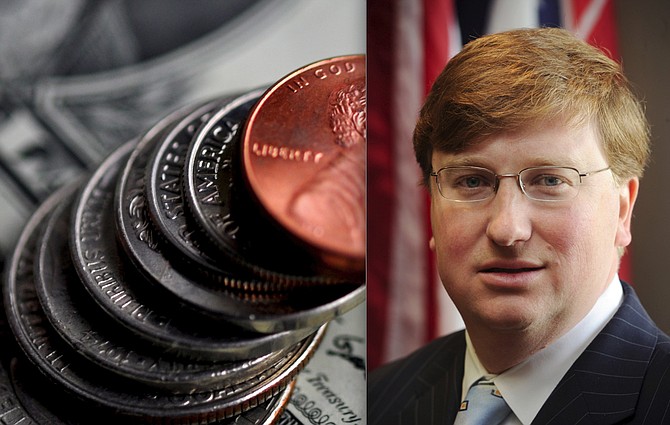Lt. Gov. Tate Reeves, who is seeking a second term, has said for months that he might propose a tax cut in 2015, but he hasn't provided details.
JACKSON, Miss. (AP) — Mississippi has state elections in 2015, and it's a safe bet that lawmakers will try to endear themselves to voters by debating a tax cut.
Gov. Phil Bryant and Lt. Gov. Tate Reeves are both seeking re-election, and they're already reciting familiar Republican talking points by saying people should keep more of the money they earn.
Any proposal that could reduce revenue will, of course, be met with skepticism by people who say underfunded schools are hurting Mississippi's prospects of emerging from perpetual poverty.
It's too soon to know what kind of tax cuts legislators will consider. They could look at a business-focused break, or at a narrowly focused reduction of income taxes.
"We're looking very closely at the possibility of an income tax cut for working-class families. So we're looking at roughly about a $40,000 income and below," Bryant told reporters last week after Hobnob, a business gathering sponsored by the state chamber of commerce, the Mississippi Economic Council.
The governor, who is seeking a second term in 2015, said he asked the Department of Revenue to check how many people fall into that income bracket and how a tax reduction would affect the state budget.
"If there's a possibility of looking at a segment of the population and putting some money back into their hands, I would like to do that," Bryant said. "Now, people might say, 'Oh, that's only $100.' But when it costs you $50 to fill your pickup truck up, $100 is effective."
Mississippi residents pay 3 percent tax on their first $5,000 of taxable income, 4 percent on the next $5,000 and 5 percent on taxable income over $10,000.
Reeves, who's also seeking a second term, has said for months that he might propose a tax cut in 2015, but he hasn't provided details.
"Isn't it time for taxpayers to get a pay raise?" Reeves said at Hobnob. "I certainly think so.... You know how to spend your money much better than any bureaucrat in Jackson knows how to spend your money."
Mississippi is spending just over $6 billion in the budget year that started July 1. Agency directors have requested about $1 billion more for the coming year.
"Career politicians say we can't afford a tax cut in the face of these new budget requests, but the mentality assumes we're going to grant these dramatic upticks in spending," Reeves said. "But remember what I told you when I ran for this office: I'm sticking with my conservative principles to get Mississippi's fiscal house in order, which means having the courage to say no."
Politicians of both parties campaign by saying education should be the state's priority, so it's guaranteed that any tax-cut debate will include questions about school funding.
The Mississippi Adequate Education Program, a complex funding formula designed to give schools enough money to meet midlevel academic standards, was put into law in 1997 but has been fully funded only twice — both times during election years.
During the current budget year, MAEP funding fell $257 million short of what the formula specifies. Full funding next year would require a $311.7 million increase. After Hobnob, reporters asked Bryant about the prospect of fully funding MAEP next year and he responded: "I just don't think we're going to be able to do it."
He said the state is putting millions of dollars into specific education programs, such as a two-year teacher pay raise plan and an effort to improve reading skills before children finish third grade.
"We're putting money into education," Bryant said, "but not some formula that not many people understand."
Copyright Associated Press. All rights reserved. This material may not be published, broadcast, rewritten, or redistributed.



Comments